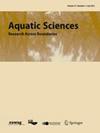Tolerance of neonates of freshwater snails to starvation and desiccation and its relationship to invasiveness
Abstract
Biological invasions threaten biodiversity and cause severe ecological and socioeconomic impacts. Freshwater snails are very diverse and many became invasive or have the potential to do so. Studies on the relationship between bioecological traits and invasiveness are needed to prevent new invasions. The tolerance to environmental stressors of the neonate, one of the most vulnerable ontogenetic phases, may be an important component of invasiveness in freshwater snails. We hypothesize that tolerance of neonates to environmental stressors increases the chances of population establishment and persistence and hence of becoming an invader. We predict that the neonates of invasive freshwater snails will show higher survival under starvation and desiccation than those of non-invasive ones and tested this experimentally for three species of each type. We also estimated neonate volume as a proxy of tolerance. We found that the desiccation stress was more severe than the starvation one. The tolerance to starvation of two of the invasive species (Melanoides tuberculata and Pomacea canaliculata) was much higher than that of remaining species but the pattern was less clear for desiccation, which was more directly related to neonate volume. None of the non-invasive species showed high tolerance to these stressors and the invasive Physella acuta groups with them in this regard. On the whole our prediction about the relationship between neonate tolerance and invasiveness stands for five out of the six species tested, indicating that the tolerance of neonates of freshwater snails merits more research effort on other stressors to gain a sounder comprehension of their invasiveness.

 求助内容:
求助内容: 应助结果提醒方式:
应助结果提醒方式:


